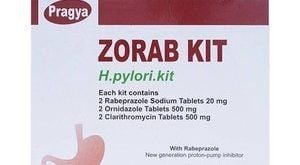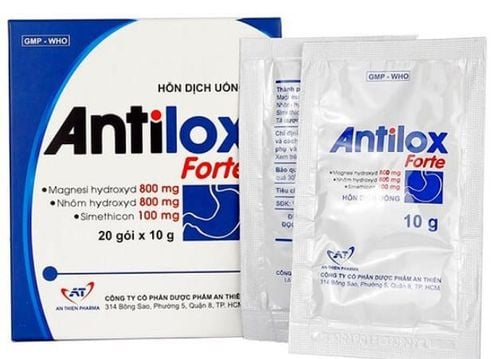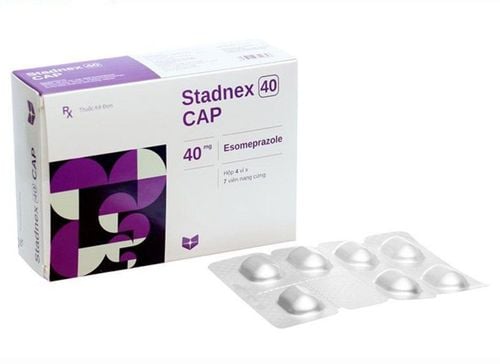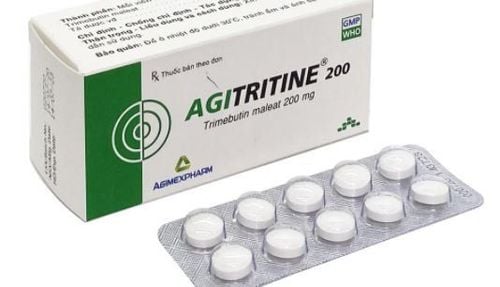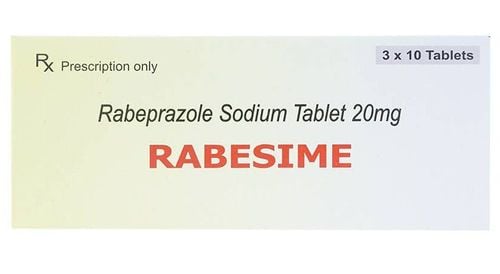This is an automatically translated article.
Rabicad 10 is a medicine used to treat stomach and duodenum quite commonly used today. What is Rabicad 10 used for and how is it used? The following article will provide all the basic information about the drug Rabicad 10.
1. What is Rabicad 10?
Rabicad 10 is a drug belonging to the group of gastrointestinal drugs. The main ingredient of the drug contains Rabeprazole sodium 10mg.
Main effects of Rabeprazole:
Inhibiting gastric acid secretion by stimulating the Dibutyl cyclic AMP contained in the gastric gland and stimulating histamine or pentagastrin. After clinical trials. The experts concluded that rabeprazole sodium raised blood gastrin levels lower than other proton pump inhibitors but reversed the antisecretory activity more rapidly. Anti-ulcer: Rabeprazole has strong anti-ulcer ability on many different types of ulcers, and helps to improve gastric lesions relatively well. Rabeprazole is indicated in the treatment of duodenal ulcers, esophageal reflux and Zollinger-Ellison syndrome.
2. Uses of Rabicad 10
Rabicad 10 has an anti-ulcer effect, heals peptic ulcers caused by inflammation very well, and helps inhibit gastric acid secretion, rapidly improving symptoms of peptic ulcer disease. a period of use.Indications to use Rabicad 10 in the following cases:
Treatment of peptic ulcers. Treatment of mouth ulcers, reflux esophagitis. People with Zollinger-Ellison syndrome. The drug is contraindicated in patients with a history of allergy or hypersensitivity to any of the ingredients.
3. Dosage and how to use Rabicad 10
Rabicad 10 is produced as enteric coated tablets. Packed in a big box, each box contains 10 small boxes and in a small box there is a blister of 10 tablets.
Dosage:
For adults: take 10mg/day, adjust the dose depending on the severity and condition of the patient, can increase to 20mg/day. The recommended duration of treatment for patients with duodenal ulcer is 4 to 8 weeks, and for patients with reflux esophagitis and peptic ulcer, it is 6 to 12 weeks.
4. Side effects and notes when using Rabicad 10
Possible side effects when taking Rabicad 10:
Rash, urticaria, headache, affecting liver function. Constipation or diarrhea depending on the patient, feeling of fullness, heaviness in the abdomen. In addition, there may be side effects related to Rabeprazole such as:
Causes body weakness, feeling tired, chills. Allergic reactions can still occur. Digestive disorders lead to dry mouth, belching, loss of appetite, poor appetite but increased appetite. Rectal bleeding, black stools. Having some inflammatory conditions such as: cholecystitis, mouth ulcers, gingivitis, glossitis, esophagitis or pancreatitis, colitis... In addition, there are cases where the patient also has chest pain under the bone. chest, stiff neck, or increased photosensitivity during treatment with rabeprazole. To limit unwanted effects when taking the drug, it is necessary to note the following:
Use the drug according to the instructions of the specialist doctor, do not arbitrarily change the dose increase or decrease without consulting the doctor. doctors or medical professionals. The drug increases the concentration of Digoxin in the blood and prolongs the metabolism and excretion of Phenytoin, so it should be used with caution. The use of Rabicad 10 for the treatment of patients with gastric ulceration should exclude the possibility of malignancy of previous gastric lesions. Use with caution in pregnant or lactating women, weigh the benefits and harms, and consult your doctor before taking the drug. Caution should be exercised in patients with hepatic impairment. If overdose, monitor abnormal signs of the body, contact specialist doctors or the nearest medical facility for timely and proper treatment support. Unfortunately, if you miss a dose, take it again as soon as you remember, if it is close to the next dose, skip the previous dose, do not take a double dose to make up for the missed dose. Store medications according to the manufacturer's instructions. Keep medicine out of reach of children. Gastroduodenal disease has been and is still very common in clinical practice due to many different causes. Understanding drugs to know how to use them safely and effectively is essential. Contact your doctor when having health problems for proper and timely treatment advice.




